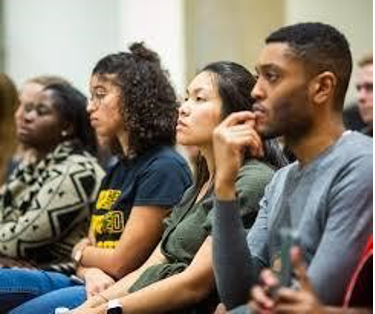
On first impression, the religious complexion of the recent U.S. elections showed more similarities than differences to voting behavior in 2016. Republican and Democrat voting patterns showed secular and unaffiliated Americans, along with religious minorities lining up with the latter while a significant share of active Protestants and Catholics, particularly evangelicals, sided with the former. Looking at exit polls, sociologists and pollsters addressing a post-election webinar hosted by the Society for the Scientific Study of Religion found that COVID and other events since 2016 did not stop the vast majority of evangelicals and over half of white Catholics from voting to re-elect Donald Trump in 2020. Gerardo Marti of Davidson College argued that surveys  conducted during the election season revealed that many evangelicals no longer tolerate Trump’s questionable morality and support him mainly for his defense of conservative Christian concerns as was the case in 2016 but rather have come to praise the president’s moral qualities and even his “anointing” as a leader. The fact that almost one-quarter of Latinos—and not only Cubans– voted for Trump shows the inroads that evangelicalism has made in this diverse ethnic group. Marti added that an affinity for the Christian right is developing as Latinos turn to evangelical churches. “Latinos are moving into the same networks as white Christians,” he said.
conducted during the election season revealed that many evangelicals no longer tolerate Trump’s questionable morality and support him mainly for his defense of conservative Christian concerns as was the case in 2016 but rather have come to praise the president’s moral qualities and even his “anointing” as a leader. The fact that almost one-quarter of Latinos—and not only Cubans– voted for Trump shows the inroads that evangelicalism has made in this diverse ethnic group. Marti added that an affinity for the Christian right is developing as Latinos turn to evangelical churches. “Latinos are moving into the same networks as white Christians,” he said.
Newsweek (November 9, 2020) reports that exit polls showed that Trump’s support among white evangelicals slipped around five percentage points nationwide to 76 percent, and more in some battleground states. Trump’s losses in Georgia and Pennsylvania, and Michigan, including Kent County, considered an evangelical stronghold, helped give Biden more votes than Hillary Clinton had four years earlier. Minnesota pastor Doug Pagitt, founder of the pro-Biden Vote Common Good, said his group’s data suggests 70 percent of white evangelicals voted for Trump, down from 81 percent four years ago. He added that the group’s research indicates that 300,000 white evangelicals statewide ditched Trump, more than the 157,000 non-evangelicals who did likewise in the state. Meanwhile, writing on the website of the Interfaith Youth Corp (November 16, 2020), Columbia University sociologist Musa al-Gharbi accented the growing divide between secular Democrats and religious Republicans that even shows up among religious minorities. Al-Gharbi writes that since 2016, there is a pattern of white disaffection from the GOP while people of color have moved more toward the Republicans. Trump did worse among white people than he did in 2016 while he picked up more votes among blacks, Hispanics, and Asians. Al-Gharbi said that much of this shift has to do with religion.
In a trend that preceded Trump, a segment of minority voters has become alienated from the social liberalism of the Democrats, even if they might continue supporting the “bread-and butter” issues of the party, according to al-Gharbi. Even Muslims, a group that Trump conflicted with early in his presidency, showed almost a three-fold increase in turning out for him compared to 2016. “This marks a stark contrast to Barack Obama and George W. Bush, who lost a significant chunk of these voters after their first stints at the White House,” al Gharbi writes. This shift among some Muslims may reflect the greater African-American vote for Trump since a segment of blacks are Muslim, but it may be due to Trump’s more moderate tone toward Muslims later in his presidency and his support for withdrawing troops from the Middle East, he adds. Amplifying on these findings, Princeton University’s Robert George writes in the National Catholic Register (November 6, 2020) that the small yet growing movement of minorities to the Republicans may show that the “key to winning for Republicans, at least today, is to combine economic populism with social conservatism…What was the thing that kept minorities from getting on board with the Republican Party? What stopped the Republican Party from at least getting maybe 25 percent? It was not social conservatism. Minorities tend to be disproportionately more religious and socially conservative than non-minorities, especially when we’re talking about Black and Latino minorities…If they’re smart, the Republicans will do a big outreach to two kinds of Catholics: white, Mass-attending Catholics and Latino Mass-attending Catholics. Those constituencies will likely find the combination of social conservatism and economic populism extremely appealing.”
But Christianity Today (October 27, 2020) reports that not all religious minorities are moving in a Republican direction. The presidential election has split Asian Americans along generational and cultural lines, especially those of Chinese background. This year, the Chinese was the Asian ethnic group with the largest proportion of undecided voters in the presidential election (a high 23 percent). This tendency may be because most recent Chinese immigrants come from mainland China, unlike previous generations that came from more democratically inclined Hong Kong and Taiwan. Many of the older Chinese-American follow pro–Trump Chinese pastors and speakers online and also conservative evangelical leaders like Focus on the Family founder James Dobson. It is a different story for second-plus-generation Chinese Americans; every young Chinese-American evangelical interviewed for the article was voting for Biden, “and their top issues—climate change, gender and racial equality, immigration, and the pandemic—had almost no overlap with that of first-generation immigrants. Their view of the gospel often extended beyond personal piety and single issues.”